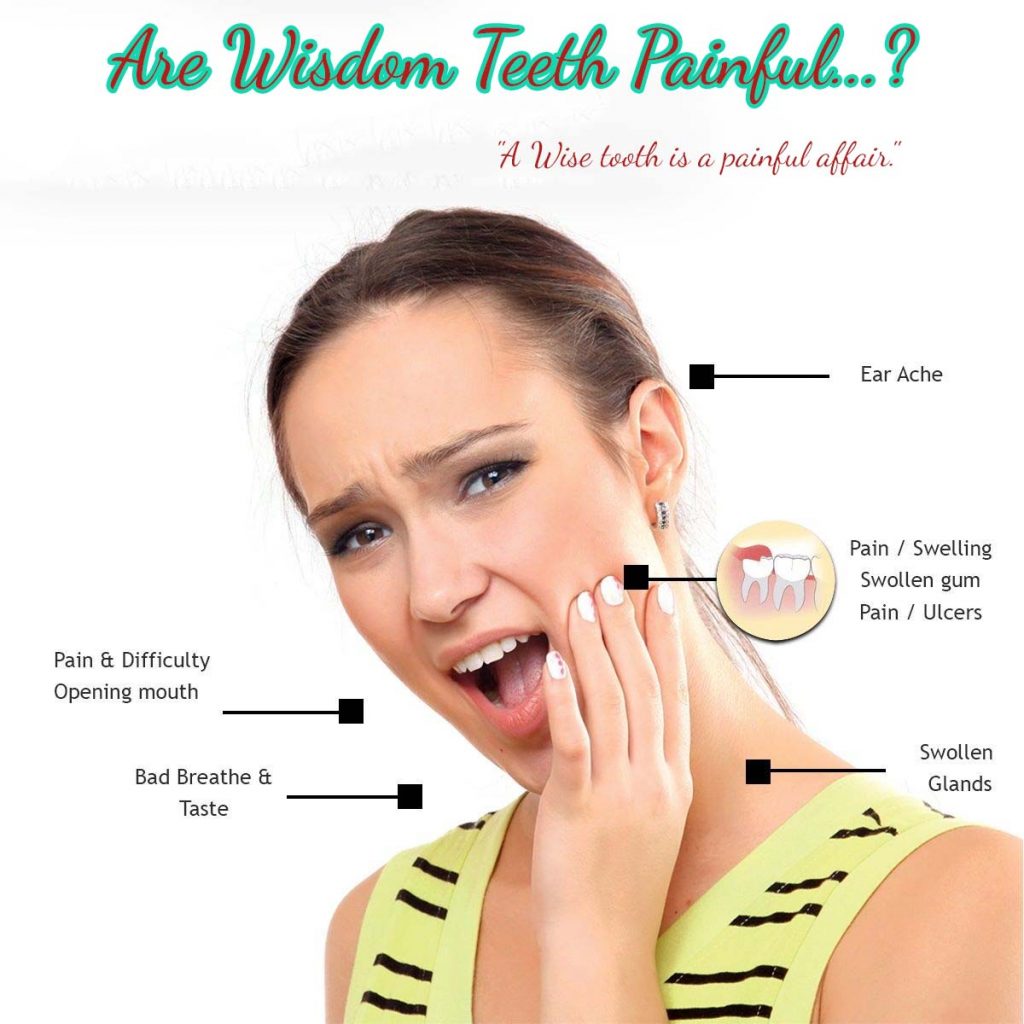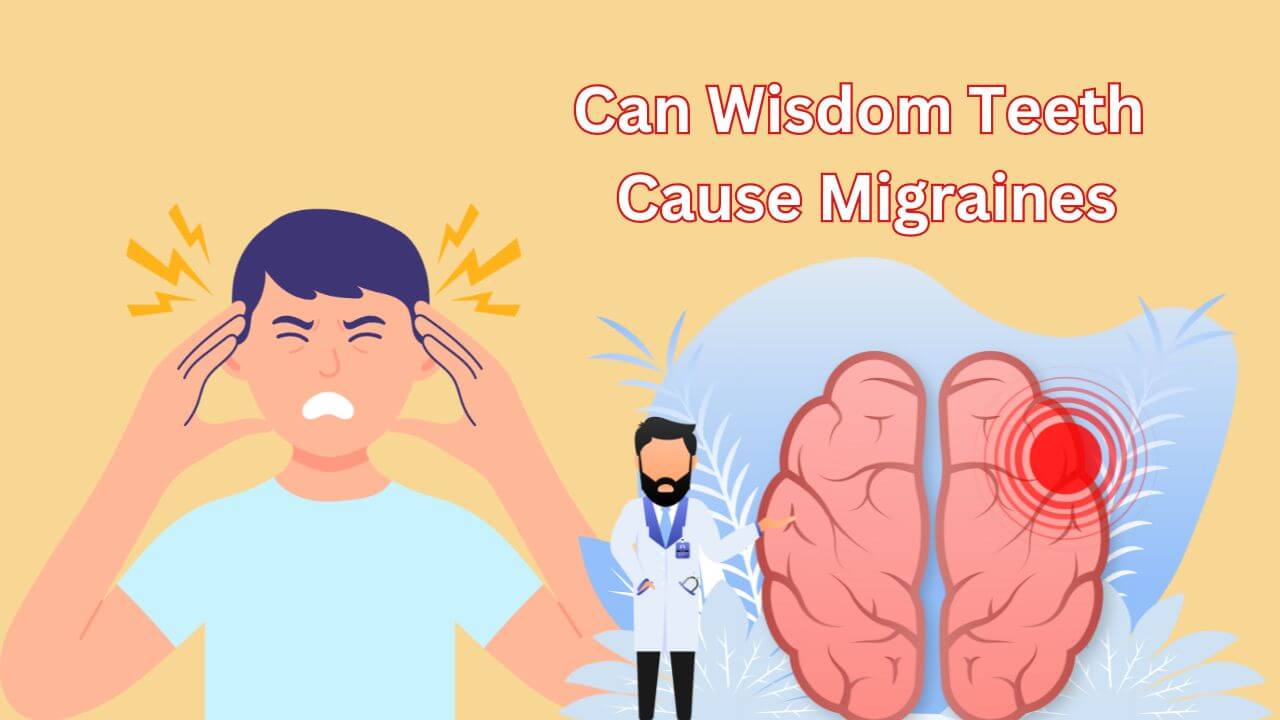Can Wisdom Teeth Cause Migraines: Wisdom teeth can indeed trigger migraines if they become impacted or infected. The pain from these teeth can radiate and contribute to headache disorders.
Dealing with wisdom teeth issues is a common rite of passage for many adults. Often erupting in the late teenage years or early twenties, these molars can become a source of significant discomfort and dental problems. While they were once necessary for our ancestors’ more brutal diet, modern humans typically have little need for these extra chompers.
Their late arrival in a crowded mouth can lead to impaction, infections, and alignment issues. These dental complications are known to cause a variety of symptoms, including headaches and potentially exacerbating migraine conditions. Addressing wisdom teeth problems promptly with a dental professional can alleviate associated pain and prevent further oral health issues. Understanding the connection between your wisdom teeth and migraines is crucial for maintaining overall well-being and managing headache-related discomfort.
The Anatomy Of Wisdom Teeth
Understanding wisdom teeth begins with exploring their anatomy. The final teeth that erupt in the mouth are these ones, commonly referred to as third molars. They sit at the back, waiting to break through the gums. But why do they exist, and can they cause headaches or migraines? Let’s delve into the details.
Location And Purpose
The back corners of the mouth contain the wisdom teeth. They are the final set of molars most people get in their late teens or early twenties. Their primary role was to grind plant tissue. Today, they often become redundant due to dietary changes.
Wisdom Teeth Emergence Timeline
The timeline for wisdom teeth to emerge can vary. Typically, they appear between the ages of 17 and 25. Not everyone’s wisdom teeth erupt; for some, they stay hidden, causing potential issues.
| Age Range | Wisdom Teeth Status |
|---|---|
| 17-21 Years | Wisdom teeth may start to emerge |
| 22-25 Years | Teeth either fully visible or remain impacted |
| 25+ Years | Further growth unlikely; extraction considered if problematic |
Some people experience pressure or pain as their wisdom teeth enter the mouth. This discomfort can sometimes lead to headaches. In some instances, the pain can escalate into migraines.

Credit: patuxentorthodontics.com
Understanding Migraines
Many people experience intense headaches, known as migraines. These are not just regular headaches. Migraines can cause throbbing pain and affect daily life. Some individuals notice a link between wisdom teeth issues and migraines. Let’s explore how migraines work, their symptoms, and various triggers.
Symptoms And Triggers
- Intense throbbing pain: Often on one side of the head.
- Sensitivity to light and sound: Bright lights and loud noises can worsen pain.
- Nausea and vomiting: A common symptom during a migraine.
- Visual disturbances: Some see flashes of light or blind spots.
Different factors can trigger a migraine. These include stress, certain foods, changes in weather, and hormonal changes. For some, dental issues such as impacted wisdom teeth may also lead to migraines.
Types Of Migraines
| Type | Description | Common Features |
|---|---|---|
| Migraine without aura | This is the most common type. No warning signs before the headache begins. | Pain on one side, nausea, and light sensitivity |
| Migraine with aura | Warning signs or ‘auras’ appear before the headache. These can include visual disturbances. | Flashes of light, vision loss, pins, and needles sensations |
| Chronic migraine | occurs for longer than three months on at least fifteen days per month. | Long-lasting pain, often with breaks of less severe pain |
Identifying the type of migraine can help in finding the proper treatment. It is important to note that wisdom teeth problems can lead to discomfort and may act as a trigger for those prone to migraines.
Link Between Teeth And Headaches
Many people experience headaches without knowing the cause. Surprisingly, the answer might lie in their mouths. Wisdom teeth, when impacted or misaligned, can be a source of pain that radiates to the head.
Dental Issues Leading To Pain
- Impacted Wisdom Teeth: Teeth stuck in the jaw can push against others, causing pressure and pain.
- Temporomandibular Joint Disorder (TMJ): A problem with the jaw joint can lead to discomfort in the head.
- Bruxism: Grinding teeth strains muscles, potentially triggering headaches.
How Oral Health Affects Headaches
Good oral health is crucial for avoiding headaches. Infections and inflammation in the mouth can affect nearby nerves, leading to pain in the head. Regular dental check-ups can prevent these issues and help maintain overall well-being.
| Oral Issue | Headache Link |
|---|---|
| Wisdom Teeth Complications | Pressure on dental nerves can cause severe headaches. |
| TMJ Disorders | Jaw pain can extend to the temples and cause discomfort. |
| Bruxism | Chronic teeth grinding can lead to tension headaches. |
Regular brushing, flossing, and dentist visits are essential. They keep teeth problems at bay and reduce the risk of headaches. Be mindful of symptoms like jaw pain or teeth grinding, and seek professional advice if they occur.

Credit: congressdentalgroup.com
Wisdom Teeth: Culprits Of Discomfort
Many people face pain and discomfort due to wisdom teeth. These teeth can lead to unexpected issues, including migraines.
Impacted Wisdom Teeth
Impacted wisdom teeth remain trapped in your jawbone or gums. This can cause immense pain.
- Swelling around the jaw
- Severe pain
- Difficulty opening your mouth
This pressure can sometimes extend to the head, resulting in migraines.
Infection And Inflammation
Wisdom teeth can become breeding grounds for bacteria, leading to infection and inflammation.
| Symptoms | Effects |
|---|---|
| Red, swollen gums | Pain spreads to the head |
| Pus from gums | The risk of severe infection increases |
Treating these infections early prevents further complications such as migraines.
Research On Wisdom Teeth And Migraines
Many people wonder about the connection between wisdom teeth and migraines. Pain in the jaw and headaches often occur together, leading to questions about their relationship. Let’s dive into what research says.
Clinical Studies Findings
Several clinical studies have explored the link between wisdom teeth and migraines. Findings suggest that impacted wisdom teeth can strain the jaw muscles. This strain may trigger migraines in some individuals.
Key study outcomes include:
- Impacted teeth can lead to jaw misalignment.
- Misalignment may cause muscle tension.
- Muscle tension around the jaw can trigger migraines.
These findings shed light on the potential impact of wisdom teeth on overall head pain.
Expert Opinions
Dentists and neurologists often share insights on this topic. They note that not all migraines are related to dental issues. Yet, for some, wisdom teeth removal has reduced migraine frequency.
Dental experts highlight:
- Regular dental check-ups are crucial.
- Early detection can prevent complications.
- Wisdom teeth removal might alleviate symptoms.
Experts agree that timely intervention is critical for those affected by wisdom teeth-related migraines.
Personal Accounts And Anecdotal Evidence
Many people report a link between wisdom teeth and migraines. These personal stories add to our understanding of dental health and its impact on overall well-being.
Patient Experiences
Individuals often share their struggles with wisdom teeth and headaches. Some common themes emerge from these stories:
- Intense pain that starts in the jaw and spreads to the head.
- Relief after extraction suggests a direct connection.
- Improved quality of life post-removal, with fewer migraine episodes.
These experiences, while not scientific proof, indicate a pattern worth exploring.
Dentists’ Observations
Dentists notice specific trends when dealing with wisdom teeth:
| Observation | Frequency |
|---|---|
| Impacted teeth causing discomfort | Common |
| Pressure on nerves and vessels | Occasional |
| Migraines linked to dental stress | Some cases |
These patterns suggest a potential link between dental issues and migraines.
Diagnosis And Treatment Options
Exploring the link between wisdom teeth and migraines involves proper diagnosis and treatment options. Understanding these connections helps in the effective management of symptoms.
Professional Assessment
To determine if wisdom teeth are causing migraines, a dentist or oral surgeon will conduct a thorough examination. This includes:
- Review of dental and medical history
- Physical examination of the teeth and jaw
- X-rays to check the position of wisdom teeth
This professional assessment confirms the cause of pain. It ensures the right treatment plan.
Removal And Management
If wisdom teeth are identified as the migraine trigger, removal might be suggested. Here are the steps and management techniques:
- Consultation with an oral surgeon
- Discussion of the removal procedure
- Pain management strategies post-surgery
Post-removal, follow-up care is crucial. It includes:
- Regular cleaning
- Medication for pain relief
- Rest to aid healing
This approach helps alleviate migraine symptoms effectively.
| Step | Action | Outcome |
|---|---|---|
| 1 | Assessment | Identify cause |
| 2 | Consultation | Plan surgery |
| 3 | Removal | Relieve pain |
Each step is designed to bring relief and improve quality of life.

Credit: www.sbdsd.com
Preventive Measures And Best Practices
Understanding the link between wisdom teeth and migraines leads to effective prevention. Wisdom teeth, emerging during the late teens or early twenties, can cause discomfort. If misaligned, they may trigger migraines. To avoid such issues, adopting preventive measures and best practices is crucial. Let’s explore how maintaining oral hygiene and regular dental check-ups can make a difference.
Maintaining Oral Hygiene
Keeping teeth clean is vital to preventing pain. Brush twice daily to remove food particles and plaque. Use fluoride toothpaste for stronger teeth. Floss daily to clean between teeth. This prevents gum disease, which can lead to toothaches and headaches. Replace your toothbrush every three months. A worn toothbrush won’t clean effectively.
- Brush with a soft-bristled brush.
- Rinse with an antiseptic mouthwash
- Eat a balanced diet to support dental health
- Steer clear of sugary snacks as they can cause cavities.
Regular Dental Check-ups
Visiting the dentist is essential. Dentists spot early signs of trouble. Schedule visits every six months. X-rays detect hidden wisdom teeth issues. Professional cleanings keep gums healthy. The dentist can suggest if wisdom teeth need removal.
- Before you leave the dentist office, make your next appointment.
- Follow the dentist’s advice for oral care at home
- Ask questions about wisdom teeth and migraines
- Discuss any dental pain immediately with your dentist
Frequently Asked Questions
Can Wisdom Teeth Cause Migraines:-
Can Removing Wisdom Teeth Help With Migraines?
Removing wisdom teeth can potentially alleviate migraines if they are the cause of dental pressure or pain. Consult with a dentist to assess your case.
How Do I Know If My Headache Is From Wisdom Teeth?
Headache from wisdom teeth often occurs with jaw pain, swelling, and difficulty opening your mouth. Check for tenderness around the gums or an emerging tooth at the back of your mouth. To get a precise diagnosis, speak with a dentist.
Can Wisdom Teeth Cause Ocular Migraine?
Wisdom teeth themselves are not directly linked to ocular migraines, but dental issues and stress from pain can potentially trigger migraines, which may include visual symptoms.
What Are The Symptoms Of An Impacted Wisdom Tooth?
Symptoms of an impacted wisdom tooth include jaw pain, swelling, difficulty opening the mouth, and gum tenderness. Bad breath and an unpleasant taste may also occur.
Conclusion
To sum up, wisdom teeth can be linked to migraines for some individuals. If you’re experiencing such symptoms, consulting with a dentist or healthcare provider is advisable. Early intervention may prevent further discomfort or complications related to your dental health and overall well-being.

Hello there! I’m here to assist you with health tips and tricks. Whether you’re looking to boost your energy, improve your sleep, or enhance your overall well-being, I’m here to guide you with strategies and frameworks that can empower you to make positive changes.
First and foremost, it’s important to understand that health is a holistic concept encompassing various aspects of physical, mental, and emotional well-being.

